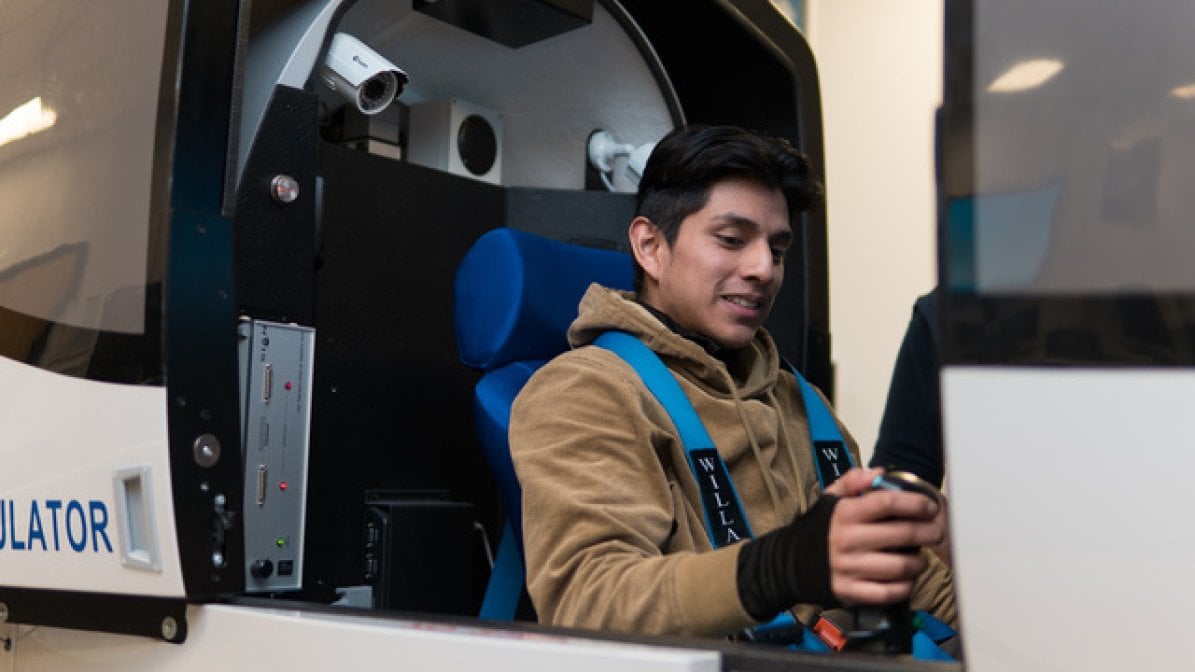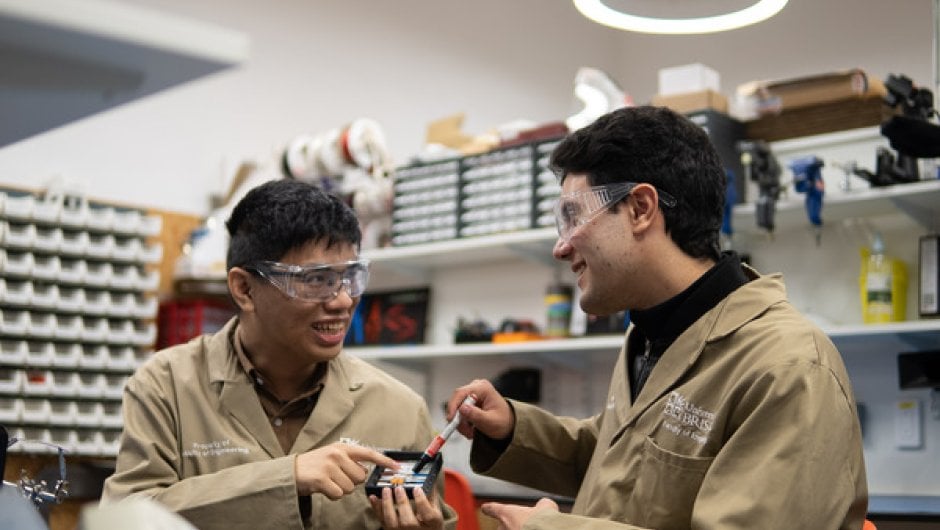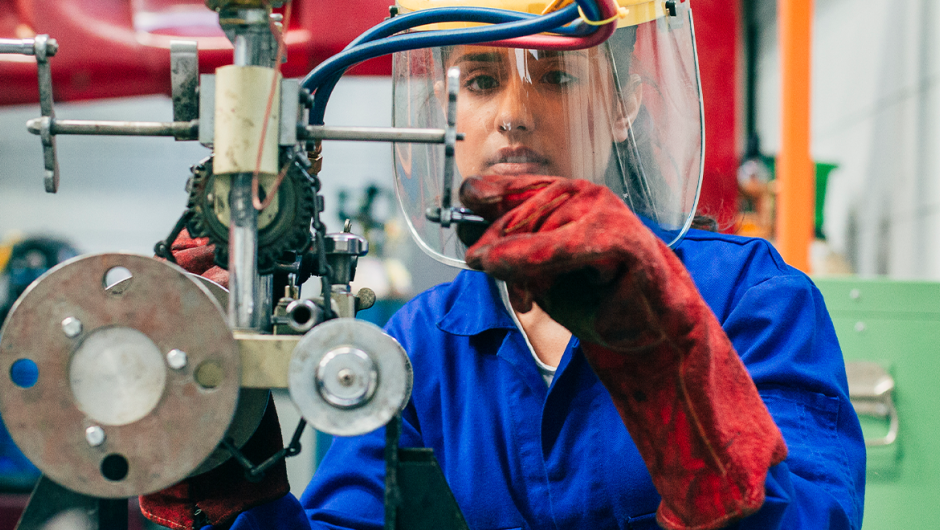What is aerospace engineering?
Where to begin? Aeronautical and aerospace engineers are responsible for some of the most incredible feats of mankind, whether that’s rockets, spacesuits, aeroplanes, or weather prediction systems. Engineers in this field design, plan, and test some of the most exciting and advanced technology in the world.
The UK aerospace industry is the second largest in the world, behind the United States, and the UK Government plans to capture 10% of the global space market by 2030.
If you choose a career in this industry you could work on things like wing design (aerodynamics), engine assembly (propulsion), fuel efficiency, space technology, or investigating air accidents. You could progress to being a project manager or a consultant aerospace engineer.
The impact you could make
- Use your aeronautical skills to keep the 224 million passengers travelling to and from UK airports every year safe and comfortable as they fly.
- Be part of a team that supports human life on Mars – designing, testing or making the spacecraft and technologies needed for us to travel to and survive on the red planet.
- Assess the impact and patterns of space weather to enable successful rocket or satellite launches.
What you could study
- Aerodynamics
- Space mission analysis and design
- Mechanics of flight
- Aircraft design
- Management and business
- Heat transfer
- Airframe design and flight dynamics
- Space systems
Chat to a current aeronautical and aerospace engineering student
Chat to a current aeronautical and aerospace engineering student using UniBuddy.
Some conversation starters for you:
- Ask which modules they really enjoyed.
- Find out how easy it was for them to make friends on their course.
- Do they have any tips on your personal statement?
- Did they do anything to prep for uni before they went?
- Are there books, podcasts or YouTube channels they would recommend?
Example module
Example assignment
Subjects it's useful to have studied first
Some aeronautical or aerospace engineering courses or apprenticeships will have requirements for previous qualifications in certain subjects. Entry requirements vary, so always check with the provider.
Physics
Maths
IT or computing
Design technology
Hard skills you'll develop
- Mechanical engineering and design
- Machinery
- Heating, ventilation and air-conditioning
- 3D modelling
- Computer-aided design
Soft skills you'll develop
- Communications
- Project management
- Problem-solving
- Innovation
Careers: Where it can take you
Find out more about your career prospects from studying aeronautical and aerospace engineering. The following information is based on a typical mechanical engineer role.
Average salary
Available jobs
Career options

What is an…. aerospace engineer?
Want to know more about the job you could end up doing if you study this subject? Aerospace engineers oversee the production of aerospace technology, from design to testing. You’ll use existing scientific concepts to create prototypes, and plan and test parts for rockets, satellites, planes, helicopters or defence missiles. You’ll also repair broken machinery, understand system failures and then refine your designs. You’ll be creative and innovative, as well as working well with a team. It’s an exciting role, at the forefront of human technology.
Find your ideal career
Take our careers quiz to find your ideal job matched to your personality type.I love that seemingly miraculous effects can be explained with relatively simple mathematical models.
Getting in: Entry requirements
Find out more about what you'll need to study aeronautical or aerospace engineering at university or as an apprenticeship.
Average requirements for undergraduate degrees
Entry requirements differ between university and course, but this should give you a guide to what is usually expected from aeronautical or aerospace engineering applicants.
A levels
Scottish Highers
BTEC: DDD

Engineering and manufacturing apprenticeships
Check out our industry guide to help you decide if an engineering and manufacturing apprenticeship might be the right choice for you.Other subjects you may be interested in
Considering an apprenticeship?
Applying for an apprenticeship is just like applying for a normal job. Here’s what you need to know:
-
1
Deadline
Apprenticeships don't follow the same deadlines as applying to uni, the deadline is down to the employer. -
2
Where to apply
You apply directly through the employer. -
3
No limits
You're not restricted to one apprenticeship application; you can do as many as you like. -
4
Apply to university and apprenticeships
There's nothing stopping you applying to university through UCAS, while also applying for apprenticeship vacancies. -
5
Find out more
Let’s talk about... engineering apprenticeships
Study for a degree in engineering while earning at the same time. Listen to our brand new podcast on degree apprenticeships from our expert panel, hosted by Radio 1’s Katie Thistleton.

Apprenticeship vacancies
Check out live apprenticeship vacancies in engineering.A day in the life of an Engineering Apprentice
Hear all about Hannah's story doing an apprenticeship at Dyson Institute of Engineering and Technology.
Explore further
Go deeper into topics around aeronautical and aerospace engineering with the following:-
1
Aerospace Insight blog
Run by the Royal Aeronautical Society, this blog features commentary on aeronautical news, as well as features and experiences from those in the industry, including a recent post by a space fan’s first sub-orbital flight. -
2
UK Aerospace and Defence (American website)
This summary of the UK aerospace and defence industry is a great way to understand where the UK stands in global terms and the jobs and opportunities available within the industry. -
3
Space Growth Action Plan
-
4
Space Daily website
For a bit of fun and space news, along with what aerospace engineers have been up to, have a look around the Space Daily website.
70% of students
Application advice
Whether it's personal statement tips or what to write in a cover letter for an apprenticeship application, our application advice will help you get ahead in your aeronautical and aerospace engineering journey.Skills, experiences, and interests to mention
- Try and get across why you want to study aerospace engineering. What turned you on to the subject – was it watching Tim Peake or Virgin Galactic? Or was it something you’ve read? If so, talk about why or how they influenced your choices.
- There are many soft skills that are important too, like teamwork, problem-solving, technical aptitude… So, think about when you’ve displayed good teamwork, like in a sports team or after-school club, and what extracurricular activities you do that might demonstrate your technical skills, like coding or video editing.
- Engineers are often curious and take the initiative. Have you ever taken apart a toy or object at home and tried to repair it? Or built something from scratch? Maybe you entered an engineering or design competition at school that shows your creativity and originality?tick
- What do you plan to do afterwards? Show you understand the industry by referencing resources you've read or companies you’re aware of, and where you see yourself after you’ve completed your studies.


